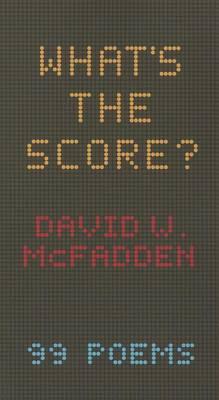David W. McFadden, What’s the Score? Toronto: Mansfield Press, 2012.
~ reviewed by Rhonda Batchelor
With “about thirty” books of poetry, fiction and travel writing to his credit, and with three Governor General’s Award nominations and a 2008 Griffin Prize shortlist appearance (for Why Are You So Sad: Selected Poems), David W. McFadden has nothing to prove. He’s revered for his distinctive voice, a playful offbeat style that invites you in, sits you down, and charms you with disarmingly detailed, multi-levelled narratives full of odd characters, mystical twists, and quirky asides. Then, before you know it, a lever’s been pulled that drops you through a trap door in your consciousness. For readers, the exhilaration of not knowing where you’ll end up can be addictive. It’s kept this reviewer reading McFadden for several decades. What’s the Score? contains ninety-nine poems written between 1988 and 1995 and “assembled and revised” between 2010 and 2012. This collection, therefore, can feel a bit like an outtakes album by a favourite musician. We have the master’s signature licks but, as a polished and complete artistic whole, it’s never going to completely cohere because it was never meant to. If you’re a fan, like me, you’ll take this at face value and sign up anyway, eager for the Zen-like sucker punch, the pie-in-the-face koan, the bliss and the misery snuggling up like pals in a photo-booth. Titles alone can be worth the price of admission (“The Vine Comedy,” “Haydn Sikh,” Ghosts Float,” and “Slowly Beloved” are among my favourites here), although they may or may not bear ready-made connection to substance or subject. In “Government Report, the speaker realizes “I could / put anything at all in a poem, / no one would read it anyway… // …I could take / a paragraph from a blood-curdling story by, say, Crad Kilodney / add a few lines from a government / report, and nobody would give a damn.” There’s a deeply cynical tone to several poems that isn’t entirely relieved by adjacent playfulness, as in “Can’t Get Much Closer Than That,” a free-association ramble: “I hope I’ve said everything I have to say / and I’m finishing off this poem but quite / frankly I’m not the fanatic that I was.” There are also love poems that disarm with their tenderness. Here’s “Hailstones,” in its entirety: “A hailstorm. It’s too lonely here. / I had no one to watch the hailstones with. / Come home, my darling. Life is sad and serious.” Yet, in those last five words, self-consciousness lurks, and the possibility of irony. Long-time readers will hear echoes from Gypsy Guitar, Anonymity Suite, and There’ll Be Another, books that appeared during the years these poems were evidently conceived. For the uninitiated, this collection may not be the best place to start—read any of his earlier works first—but if you’re experienced and ready for the McFadden free fall, you’ll know the score.
Rhonda Batchelor’s books include Bearings, Interpreting Silence, Weather Report, Roll from me like water, and the novel She Loves You. She’s the assistant editor of The Malahat Review.
Check out Arc for more odd characters, mystical twists, and quirky asides!


